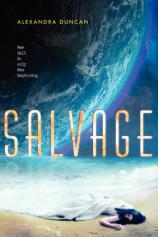 Ava, the 16-year-old protagonist of SALVAGE, has some tough times ahead --- after the spaceship she grew up on evicts her, she has to escape to earth and learn to survive on a difficult, foreign planet. And she must struggle with something else, too --- learning to read and write. In this guest post, author Alexandra Duncan discusses why she wrote about an illiterate character, delving into her time as a reading tutor in college and her own difficulties with math and science homework.
Ava, the 16-year-old protagonist of SALVAGE, has some tough times ahead --- after the spaceship she grew up on evicts her, she has to escape to earth and learn to survive on a difficult, foreign planet. And she must struggle with something else, too --- learning to read and write. In this guest post, author Alexandra Duncan discusses why she wrote about an illiterate character, delving into her time as a reading tutor in college and her own difficulties with math and science homework.
When you’re a writer, people often ask if your characters are a reflection of you. In a lot of ways, Ava, the main character in SALVAGE, and I are very similar. But we have at least one major difference:* Even though she’s 16 years old, Ava can’t read or write.
I love to read. When I was in grade school, I couldn’t wait until the day I would be ready for chapter books. In middle school and high school, books gave me an escape from an awful home situation. Now I’m a writer and librarian. Clearly, words are important to me. So why create a character who can’t read or write?
 Rewind 10 years. In college, I worked as a tutor for middle and high school students. I sometimes tutored with the AVID Program, but more often, I worked with a local literacy initiative that provided one-on-one assistance to underprivileged teens who needed help with reading. My students came from all walks of life --- the boy who came to school with stories of people being shot in the public housing project where he lived; the girls’ basketball star who confided that she didn’t like the way the men in her trailer park shouted catcalls at her when she stepped off the school bus; the newly-immigrated boy who was always up for a game of Scrabble; the student who couldn’t ever finish her homework because her parents worked nights, leaving her to care for her younger siblings; and the purple-haired girl who loved it when I read to her, even if she couldn’t read very well herself. These kids were awesome. They were kind and street-smart, complicated and clever, frustrated and determined. There were as many different reasons why they had trouble reading as there were students themselves.
Rewind 10 years. In college, I worked as a tutor for middle and high school students. I sometimes tutored with the AVID Program, but more often, I worked with a local literacy initiative that provided one-on-one assistance to underprivileged teens who needed help with reading. My students came from all walks of life --- the boy who came to school with stories of people being shot in the public housing project where he lived; the girls’ basketball star who confided that she didn’t like the way the men in her trailer park shouted catcalls at her when she stepped off the school bus; the newly-immigrated boy who was always up for a game of Scrabble; the student who couldn’t ever finish her homework because her parents worked nights, leaving her to care for her younger siblings; and the purple-haired girl who loved it when I read to her, even if she couldn’t read very well herself. These kids were awesome. They were kind and street-smart, complicated and clever, frustrated and determined. There were as many different reasons why they had trouble reading as there were students themselves.
Once I figured out that Ava would have to learn to read in the course of my novel, I wanted to try to do justice to the struggle each of my students faced. Each and every one of them was on my mind when I wrote Ava. She’s smart --- just like they were --- but even so, she doesn’t learn to read overnight. It’s a slow and frustrating process. Sometimes she wants to throw away the book she’s trying to sound out, just like I know some of my students did. She gets mad at herself and lashes out at the people trying to help her, just like my students did. Sometimes even when she makes progress, it doesn’t seem like enough. I know that frustration. I didn’t feel it with reading, but I certainly did with chemistry and trigonometry. Some nights, those subjects made me want to burst into tears and then set myself on fire.
I don’t know if any of my former students will read SALVAGE, but if they or anyone struggling to learn to read today sees this, I want them to know --- I see you. I know how hard you work. I know it feels like everything is conspiring against you and it’s two steps forward, one step back. But I also know you’re going to get there. I am cheering for you.
*Okay, two: I’m not from space.
Alexandra Duncan is a science fiction and fantasy writer. Her short stories have been published in The Magazine of Fantasy and Science Fiction and The Year's Best Science Fiction and Fantasy. She lives with her husband and two monstrous, furry cats in North Carolina.


